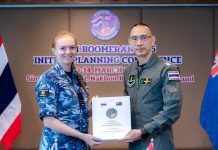 As Indonesia prepares to double its defence spending by 2029, DSEI Japan 2025 stands out as a key platform for unlocking opportunities in naval modernisation and maritime security. The event offers an exceptional gateway into the Japanese and broader Asia-Pacific defence markets.
As Indonesia prepares to double its defence spending by 2029, DSEI Japan 2025 stands out as a key platform for unlocking opportunities in naval modernisation and maritime security. The event offers an exceptional gateway into the Japanese and broader Asia-Pacific defence markets.
Indonesia’s Defence Budget and Modernisation Plans
An archipelagic nation comprising over 17,000 islands, Indonesia is boosting its defence budget by 22% in 2025, reaching IDR165.2 trillion (USD10.6 billion). This marks a decisive shift after years of underinvestment, with new priorities focusing on:
Naval upgrades to secure maritime territory
Enhanced aerial capabilities to monitor contested airspace
As part of its modernisation efforts, Indonesia has already procured two Offshore Patrol Vessels (OPVs) from Italian shipbuilder Fincantieri. Its defence partnerships are also expanding beyond traditional suppliers. Key acquisitions include:
Rafale fighter jets from France’s Dassault Aviation
Anka drones from Turkish Aerospace Industries
Strengthening Indonesia–Japan Defence Cooperation
Indonesia’s partnership with Japan is particularly noteworthy, evolving beyond procurement to include co-development and strategic maritime initiatives. Key recent developments include:
Joint Frigate Development: Japan and Indonesia are negotiating the joint production of Mogami-class frigates, with plans to build four vessels in Japan and four in Indonesia.
Maritime Security Forum: A new forum will facilitate cooperation between defence practitioners on maritime security, equipment collaboration, and technology transfer.
OPV Grant: The Indonesian Coast Guard (BAKAMLA) has signed an agreement for an OPV to be built by Mitsubishi Shipbuilding Co., fully funded by Japan via the Japan International Cooperation Agency (JICA).
High-Speed Patrol Boats: Under Japan’s Official Security Assistance (OSA) programme, two patrol boats will be delivered to Indonesia.
Regular Defence Consultations: Defence ministers from both countries have agreed to establish regular consultations focused on maritime security and defence equipment cooperation.
Indonesia’s Defence Strategy: Toward a Cohesive, Multilateral Approach
Indonesia is now centralising defence and foreign policy decision-making, shifting from a fragmented model involving multiple ministries to a more unified strategy. The goal: maintain diplomatic flexibility while deepening multilateral defence ties.
At the heart of this strategy is the Minimum Essential Force (MEF) programme, launched in 2010. MEF aims to modernise Indonesia’s military by:
Developing a green-water navy
Enhancing air combat capabilities
Increasing land force mobility
Although originally targeted for completion in 2024, funding limitations have delayed full implementation.
Looking forward, Indonesia’s navy is guided by two major frameworks:
Strategic Plan 2025–2029
Force Development Posture Plan to 2044
Both aim to strengthen the navy’s transport capabilities and overall readiness. Oversight has been bolstered with the establishment of the National Defense Council in 2024.
 For Editorial Inquiries Contact:
For Editorial Inquiries Contact:
Editor Kym Bergmann at kym.bergmann@venturamedia.net
For Advertising Inquiries Contact:
Group Sales Director Simon Hadfield at simon.hadfield@venturamedia.net




![Hanwha and ABS Partner to Strengthen U.S. Maritime Cybersecurity [Photo] Hanwha Systems, Hanwha Ocean, Hanwha Power Systems, and the American Bureau of Shipping (ABS) signed a joint research agreement on September 9 at Gastech 2025 in Milan, Italy,](https://defencereviewasia.com/wp-content/uploads/2025/09/Photo-Hanwha-Systems-Hanwha-Ocean-Hanwha-Power-Systems-and-the-American-Bureau-of-Shipping-ABS-signed-a-joint-research-agreement-on-September-9-at-Gastech-2025-in-Milan-Italy-218x150.jpeg)



![Hanwha and ABS Partner to Strengthen U.S. Maritime Cybersecurity [Photo] Hanwha Systems, Hanwha Ocean, Hanwha Power Systems, and the American Bureau of Shipping (ABS) signed a joint research agreement on September 9 at Gastech 2025 in Milan, Italy,](https://defencereviewasia.com/wp-content/uploads/2025/09/Photo-Hanwha-Systems-Hanwha-Ocean-Hanwha-Power-Systems-and-the-American-Bureau-of-Shipping-ABS-signed-a-joint-research-agreement-on-September-9-at-Gastech-2025-in-Milan-Italy-100x70.jpeg)
